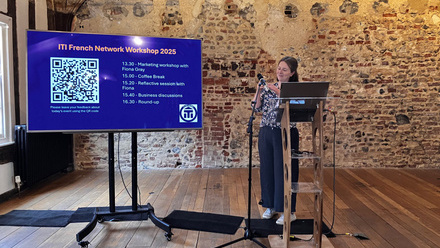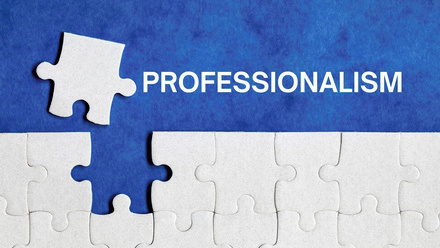More weird and wonderful CPD
From chainsaws to chat groups - we continue our series on weird and wonderful CPD, in the hope that you too are inspired.
Getting hands on
Around 35 years ago I started working full-time as a technical translator specialising in chemical engineering. Initially, I mostly translated reports written by engineers. At that time doing what we now call CPD was fairly straightforward: I used to frequent technical bookshops and read the books my customers studied when they were engineering students.That enabled me not only to deliver good translations but also to ask sensible questions and demonstrate that I understood the subject.
However, in recent years the focus of my work has shifted to a range of other fields such as construction, landscaping equipment and uncrewed aviation. The type of documents has also changed. I now mostly translate and write procedures and training materials for operational personnel. These are not areas where there are many relevant books available, so I had to take a different approach to CPD and do hands-on training courses.
I’ve now done courses in topics including mobile elevating work platforms (cherry pickers, scissor lifts and so on); chainsaws; brushcutters (like lawn strimmers, but for grown-ups); chain hoists and other lifting equipment; ride-on mower maintenance; managing electrical installations; and uncrewed aviation ‘drones’.
During the courses I also get to chat with other trainees.That helps me to understand them better, and therefore produce translations and manuals of higher quality. In other words, these courses give me opportunities to learn not just about the vocabulary of a discipline but also about its culture.
Hans van Bemmelen MITI
Hans is a freelance translator (mostly Dutch into English) and writer specialising in a range of specialist technical subjects. He is based in The Hague, the Netherlands.
Putting the personal touch into voicemail
Do you need to have a personalised voicemail message? Of course, you do. Otherwise how does the caller know they are calling the right person? When I leave a message on a number with an automatic voicemail message, I am never sure I’ve dialled the correct number.
This is exactly what voice-over artist Liz Drury said in a webinar on creating a professional voicemail greeting. She shared some useful tips and emphasised the importance of a voicemail greeting: often it’s the first time someone will hear you, and first impressions are lasting. It’s best to record in a quiet environment but in a space without too much echo. One very useful tip is to decide who your ideal client is and picture them while you record your message. And smile while you record it: you will sound friendly even if the caller can’t see you.
Before this webinar I thought my voicemail message was quite good, but needless to say I rerecorded it following Liz’s hints, and also added a bit of Russian at the end of my voicemail greeting. And don’t forget to prompt your caller to leave their number – you’d be surprised how many people forget!
Yelena McCafferty MITI
Yelena is an award-winning Russian translator and interpreter specialising in business, trade and legal matters. She runs Talk Russian, and is a committee member of the ITI Interpreters’ Development Network. Find her on LinkedIn or Instagram.
The cup that cheers the CPD
Developing a specialisation in Japanese sake made me more aware of Japan’s agricultural regions, which grow rice and other products. So the Japanese Tea Marathon, which raced through the tea-growing prefectures between 23 July and 8 August 2021, looked ideal for getting to know these areas in more depth and developing my tasting skills.
I had no intention of attending all 15 sessions…but that was before I won one of the coveted sample boxes, with two teas from each prefecture. Suddenly, I was motivated. I made a tasting notebook. Did I even own two teapots? And more importantly, did I have the time?
The sessions ran from 9am to 11am for two and a half weeks, with just two Tuesdays off. At first I thought I would keep up for a few days and then need to prioritise work, but somehow it worked out – after frantically making and tasting tea, comparing notes with others and laughing and nodding along with the producers for two hours, I got the rest of the day’s work done without finishing much later than usual. So if anything, the real lesson was that I can do more in a day than I thought.
Arline Lyons
Arline is a JP>EN translator based in Zürich, Switzerland, translating life sciences and Japanese sake but always interested in something new and tasty. See www.taste-translation.com.
Phone a friend (or colleague)
‘Really, this chat should count as CPD,’ I found myself typing into my phone in the changing room of my gym. I had just finished a workout and was catching up with a WhatsApp-group discussion on the advantages and disadvantages of monaural versus binaural listening (for conference interpreters). The learning effect I felt scrolling through the mix of solid evidence and personal experience was palpable, so the CPD connection was obvious. Quite a few colleagues in the group agreed. And why not?
The WhatsApp group in question had been founded by two dear colleagues at the beginning of the pandemic to bring together experienced UK-based conference interpreters keen on networking and discussing cutting-edge remote-interpreting matters. It also acts as a platform for sharing job alerts and looking for colleagues with specific language combinations.
The group was meant to be large enough to allow diverse and multifaceted exchanges while keeping an informal tone. Admission is done by current members suggesting new entrants. There might be a natural ceiling, though, if the informal and organic nature of the group is meant to stay.
Sometimes the group is quiet, but often there is a lot going on: live alerts about novelties or bugs with conferencing platforms; notifications about interesting ‘official’ CPD events; job offers; workarounds for unforeseen issues; discussions of controversial ideas; some moaning or letting off steam to like-minded colleagues; discussions of good and bad practice…and general peer support.
Udo Jörg MITI
Udo is a German conference and business interpreter and translator. For almost a decade, he also worked as a part-time senior lecturer in interpreting at London Metropolitan University. You can contact him at [email protected] or via Twitter.
If you have undertaken unusual CPD that you would like to share in this column, please email Kari Koonin (Professional Development Committee chair) at [email protected].






